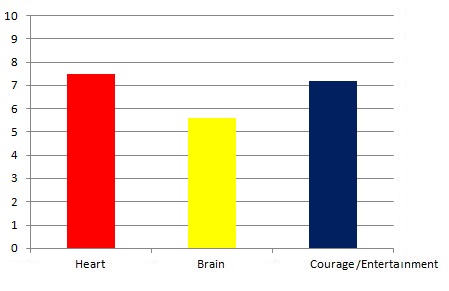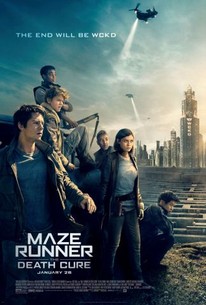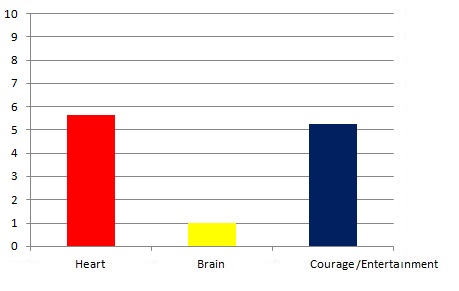
Main Page
Alphabetical Menu
Chronological Menu
|
The Competition  Lauren Mauldin (Thora Birch) has written a successful blog about The Pig Theory, her belief that boyfriends are most likely to cheat on their girlfriends after the sixth month of dating. Gena (Claire Coffee), her sister, works at a law firm and offers a partnership deal to her underling, Calvin (Chris Klein), if he agrees to help her to put an end to The Pig Theory blog and to Lauren's imminent book deal. He must woo Lauren to try to prove to her that good guys do, indeed, exist.
Thora Birch gives a tender, nuanced performance that exudes charisma. She's just as radiant as Leslie Caron was in Gigi. Bravo to her for choosing one of the most interesting, complex roles since Enid in the cult classic Ghost World. Lauren and Enid have striking similarities when it comes to their admirable traits: both are critical thinkers who aren't afraid to stand their ground and to speak their mind, even if their opinions go against the grain. Like many human beings, they're innately confused, angry, cynical, frustrated, have dysfunctional families, and are undergoing a coming-of-age. They also like to add some color to their hair: Enid dyes her hair turquoise while Lauren adds a pink hair extension. Their similarities stop there, though. Lauren doesn't seem to have a clue that the relationship with her mother and sister are toxic. Everyone around her invalidates her true feelings to try to change her to become their preferred, idealized version of herself. Claire's reason for wanting to change Lauren seems selfish: she admits that she's afraid to lose the sister she had grown up with. What's wrong with someone changing their attitude and feelings by being a little angry and cynical? What's wrong with being confused? To be human is to be confused. All of those feelings are an integral part of growing up, discovering one's true self, and experiencing an epiphany. What's wrong with having a different opinion? When Calvin sees Lauren's blog for the first time and calls it "awesome", Claire replies "No, it's pathetic!" as if he were wrong about his own feelings. Calvin later scoffs at Lauren when she explains to him The Pig Theory. Maybe he's confused, too? The fact that Calvin suddenly removes Lauren's pink hair extension makes him seem like a controlling jerk, though. Why did he remove it from her hair? Why did she not ask him to give it back and continue to wear it? Lauren's mother, Clemie (Catherine Johnson), tries to talk Lauren out of continuing her blog even though Lauren states quite explicitly that she's standing up for what she believes in---as she has every right to do to do. She naggingly asks Lauren when she'll get married and provide her with grandchildren; she doesn't even try to understand Lauren or to encourage her to follow her dreams and true feelings. Hopefully, someone in Lauren's future will be kind enough to suggest her to read the book Will I Ever Be Good Enough?: Healing the Daughters of Narcissistic Mothers by Karyl McBride which might enlighten her, help her to truly love herself and to be truly happy which every human being deserves to be. As Whitney Houston wisely observed in the song "Greatest Love of All", learning to love yourself is, indeed, the greatest love of all. Thora Birch and Chris Klein have great chemistry together, especially in a beautiful, romantic scene that takes places in front of the warm glow of a fireplace. Unfortunately, that chemistry is slightly undermined by an intrusive musical score which also overbearingly intrudes other scenes where the characters converse with one another. If only director Harvey Lowry and screenwriter Kelsey Tucker were to trust the audience's emotions instead of telling them how they're supposed to feel. Some of the dialogue sounds stilted with clunky expositions and overexplanations that leave very little room for interpretation. It would have been nice to hear what Lauren and Calvin were saying to one another during their dates instead of seeing a montage of the dates with the musical score drowning out the dialogue. More humanism, a truly special effect, would've gone a long way here. To be fair, although the film is filled with contrivances, I felt engaged by most of the contrivances because I was able to suspend my disbelief. There are different shades of realism; if you're looking for a thoroughly slice-of-life form realism, go watch an Eric Rohmer, i.e. A Summer's Tale or Le Rayon Vert. On the other hand, The Competition is an upbeat form a realism that may not entirely earn its happy ending because of unresolved issues and undercooked subplots, but it does comes close. There are no dull or schmaltzy moments to be found, and the use of symbolism bookending the film is refreshingly witty, amusing and clever. Any film that can't be turned into a video game is a blessing these days. The Competition would make for a great double feature with Muriel's Wedding about a young woman who learns how to truly love herself while undergoing an ephiphany about love, friendship and marriage, but, unlike Lauren, she actually becomes aware of her dysfunctional, toxic family. Bringing Up Baby and Gigi would also pair well The Competition.  Maze Runner: Death Cure  Thomas (Dylan O’Brien), Newt (Thomas Brodie-Sangster), and Frypan (Dexter Darden) managed to escape from the labyrinthine maze "The
Glades" and now remain on the run from the nefarious government agency WCKD. They just Jorge
(Giancarlo Esposito) and Brenda (Rosa Salazar) on a quest to free Minho (Ki Hong Lee) who's
being held hostage at a WCKD facility in Last City. There, scientist Ava Page (Patricia
Clarkson) conducts experiments on Minho and others in an attempt to find a cure for a deadly
virus called "Flare." The final entry in
the Maze Runner series suffers from the same problems that Star Wars: The Last
Jedi suffers from. It begins with a thrilling first act before a dull second act that only
regains some momentum during the final, action-packed 30 minutes. Until then, the screenplay by
T.S. Nowlin wastes too much time with banal exposition and poor attempts at generating
poignancy. None of the characters feel like human beings worth caring about, although Dylan
O'Brien has the acting chops to compensate for the shallow, pedestrian slightly during the
dramatic scenes. Patricia Clarkson is wasted in a role that's beneath her: she's even given
some scenes where she says absolutely nothing and just stands there without even react to
what's going on. She's a great actress who deserves a much better screenplay and complex role
rather than playing a bland, cartoonish villain. On a positive note, the action scenes are well-choreographed and there's plenty of visual style that provide some eye candy. A scene involving a dangling bus is one of the most exhilarating scenes in the film, but it's ephemeral exhilaration. There's too much spectacle and not nearly enough Truth within the Spectacle. A truly great blockbuster ought to have a heart, soul and somewhat of a brain along with a balance of Truth and Spectacle. Blockbusters like Iron Man and Spider-Man had a decent balance of Truth and Spectacle; Maze Runner tries, but fails to find that much-needed balance. It's also mind-numbing without even remotely trusting the audience's intelligence or imagination. On top of that, the film overstays its welcome at a running time of 2 hours and 22 minutes. If the second act were trimmed by 30 minutes, it'd be at least mildly entertaining instead of being mostly exhausting.  Main Page Alphabetical Menu Chronological Menu ______________________________________________________ |
The NYC Movie Guru
themovieguru101@yahoo.com
Privacy Policy